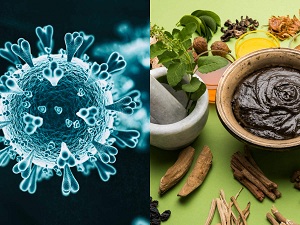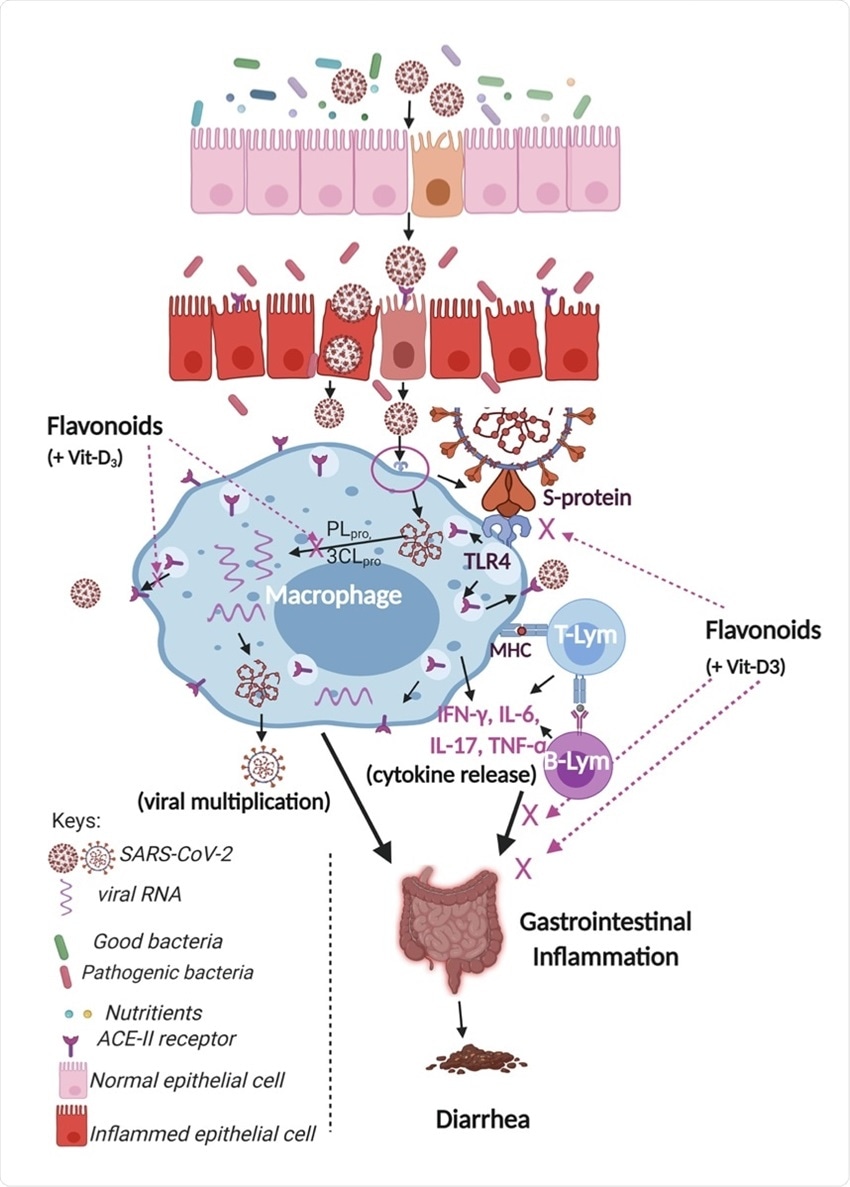Flavonoids Epigallocatechin, Baicalin, Hesperetin, Luteolin and Quercetin Helps Prevent COVID-19 Induced Gastrointestinal Inflammation And Diarrhea
Source: COVID-19 Supplements-Flavonoids Sep 18, 2021 4 years, 4 months, 2 weeks, 6 days, 21 hours, 5 minutes ago
COVID-19-Supplements: As part of Thailand Medical News continued initiatives on herbs and phytochemical research for treating COVID-19 and also Long COVID, the following coverage on the usage of herbs and phytochemicals to treat COVID-19 and a health conditions arising with the novel coronavirus infection or what is termed as Long COVID or PASC (Post-acute Sequelae of COVID-19) shows the growing importance and role that phytochemicals can play in this current COVID-19 pandemic and also in the health crisis that is expected to last for the next 3 decades or more as a result of the long term effects of the novel coronavirus infection. To date skepticism on the usage of phytochemicals and herbs has only been expressed by the ignorant Western societies in America and the United Kingdom that are bend on using toxic unproven drugs to treat COVID-19 or the focus has been on antibody therapeutics which time is slowly proving to be ineffective. Off course the influence of big Pharma and also corrupted Western politicians also big factors but sadly the most COVID-19 infections and deaths have also been reported in these Western countries and will continue to do so especially in coming surges with new potent SARS-CoV-2 variants at play. Countries in Asia, South America, Australia, Canada, Africa and elsewhere in Europe should continue to focus on herb and phytochemical research as the solutions to many of the conditions arising from the SARS-CoV-2 infection are there.

In this new study by researchers from University of Development Alternative (A private university)-Bangladesh, University of Tasmania, Hobart, Australia Walailak University-Thailand, University of Aveiro-Portugal and the University of Nottingham Malaysia Campus, it was found that a class of phytochemical called flavonoids including epigallocatechin, gallocatechin, baicalin, hesperetin, luteolin and quercetin could help prevent gastrointestinal inflammation and also diarrhea induced by the SARS-CoV-2 infection.
Infection by the SARS-CoV-2 virus resulting in COVID-19 disease can lead to massive inflammation in the gastrointestinal tract causing severe clinical symptoms. SARS-CoV-2 infects lungs after binding its spike proteins with alveolar angiotensin-converting enzyme 2 (ACE2), and it also triggers inflammation in the gastrointestinal tract. SARS-CoV-2 invades the gastrointestinal tract by interacting with Toll-like receptor-4 (TLR4) that induces the expression of ACE2. The influx of ACE2 facilitates cellular binding of more SARS-CoV-2 and causes massive gastrointestinal inflammation leading to diarrhea. Diarrhea prior to COVID-19 infection or COVID-19-induced diarrhea reportedly ends up in a poor prognosis for the patient.
Flavonoids are part of traditional remedies for gastrointestinal disorders. Preclinical studies show that flavonoids can prevent infectious diarrhea. Recent studies show flavonoids can inhibit the multiplication of SARS-CoV-2. In combination with vitamin D, flavonoids possibly activate nuclear factor erythroid-derived-2-related factor 2 that downregulates ACE2 expression in cells.
The study findings suggest that flavonoids have the potential to prevent SARS-CoV-2 induced diarrhea.
The study findings were published in the peer reviewed journal: Frontiers in Microbiology-Virology.
https://www.frontiersin.org/articles/10.3389/fmicb.2021.698169/full
The SARS-CoV-2 coronavirus
, which is the virus responsible for the COVID-19 disease has infected over 228 million worldwide and caused the deaths of almost 4.7 million people.
Across the world, a huge subset of patients who sustain an acute SARS-CoV-2 infection are developing a wide range of persistent symptoms that do not resolve over the course of many months. These patients are being given the diagnosis Long COVID or Post-acute sequelae of COVID-19 (PASC). It is likely that individual patients with a PASC diagnosis have different underlying biological factors driving their symptoms, none of which are mutually exclusive.
Unknown to many, the SARS-CoV-2 coronavirus can cause massive inflammation in the gastrointestinal (GI) tract of infected individuals, thus leading to several clinical symptoms including diarrhea.
https://pubmed.ncbi.nlm.nih.gov/32639848/
The virus is also able to cause a variety of gastrointestinal conditions in the long term as a result of the inflammation including the possibility of cancer according to some experts.
Previous reports have found that diarrhea prior to COVID-19 infection or COVID-19-induced diarrhea often increases the patient’s odds of a poor prognosis.
https://www.nejm.org/doi/pdf/10.1056/nejmoa2002032
Past studies have shown that flavonoids, which are a type of phytochemical, can prevent infectious diarrhea.
https://pubmed.ncbi.nlm.nih.gov/14559685/
https://pubmed.ncbi.nlm.nih.gov/31926988/
The
COVID-19-Supplements study revealed that flavonoids can help prevent diarrhea in COVID-19 patients when combined with vitamin D. Taken together, this combination treatment can activate nuclear factor erythroid-derived-2-related factor 2 (Nrf2 transcription factor), which downregulates the expression of the angiotensin-converting enzyme 2 (ACE2) receptor in cells.
Although the COVID-19 disease is primarily a respiratory illness, a wide range of other symptoms may appear in affected individuals. Diarrhea, for example, appears to be a common clinical symptom in some infected patients.
In fact, diarrhea has also been reported in cases of severe acute respiratory syndrome (SARS) in 2003 and the Middle East respiratory syndrome (MERS), both of which are structurally similar to SARS-CoV-2.
According to a published study, current estimates indicate that 10.6% of patients will experience diarrhea during acute SARS-CoV-2 infection.
https://pubmed.ncbi.nlm.nih.gov/32278065/
 Role of flavonoids against SARS-CoV-2 induced diarrhea.
Role of flavonoids against SARS-CoV-2 induced diarrhea.
It is known that upon entry into the human host, SARS-CoV-2 triggers the immune system in an effort to prevent viral replication in the body. Initially, SARS-CoV-2 infects the human lungs after binding with the ACE2 receptor, which subsequently causes the body to increase the levels of angiotensin II in the blood. As a result, the body releases chemokines, as well as activates cytotoxic (CD8+) and helper (CD4+) T-cell lymphocytes, macrophages, and natural killer (NK) cells.
The cytotoxic T-cells produce interleukin-2 (IL-2) and interferon-gamma (IFNγ), whereas the helper T-cells release pro-inflammatory cytokines like the IL-4, IL-17, IL-21, and IFNγ. Taken together, these substances cause a massive release of mucus that may lead to severe acute respiratory distress syndrome.
It has been found that when there are increased levels of cytokines in the blood, the gut may also be affected. This inflammation may cause significant damage in the layers of the intestinal mucosa. Further, the imbalance in the gut microbiota and damage to the mucosal cellular barriers facilitate SARS-CoV-2 multiplication and translocation into other tissues in the body. This imbalance, termed dysbiosis, causes diarrhea, mucus secretions, stomach pain, or blood in the stool.
The phytochemicals called flavonoids are commonly found in plants and vegetables. Some of the most common flavonoids include quercetin, baicalin, hesperetin, luteolin, gallocatechin, and epigallocatechin, all of which are secondary metabolites of plants. Taken together, these substances are considered antioxidant, anti-inflammatory, and antimicrobial agents.
It has been found that flavonoids can also help boost the immune system to ward off infections, as they have been found to inhibit some enzymes that are important for the SARS-CoV-2 replication.
The study findings revealed that flavonoids, particularly epigallocatechin-3-gallate found in green tea, along with vitamin D3, can activate the Nrf2 transcription factor. The activation of Nrf2 transcription factor subsequently downregulates ACE2 expression from the cellular surfaces.
Flavonoids also have the potential to alleviate COVID-19 and/or ease diarrhea. Quercetin, the most popular flavonoid, has been shown to prevent the interaction of the SARS-CoV-2 spike protein and ACE2 receptor and suppress the inflammatory markers.
The study team says that more preclinical and clinical studies are needed to further explore the full potential of these phytochemical compounds against COVID-19-induced diarrhea.
In the meantime taking these flavonoid supplements in moderate doses can help not only in preventing COVID-19 induced diarrhea but also help prevent disease severity and increased risk of mortality and even act as a prophylaxis. Read more at:
https://www.thailandmedical.news/articles/covid-19-herbs
https://www.thailandmedical.news/articles/covid-19-supplements
Thailand Medical News strongly recommends only buying the following brands of supplements: Thorne Research, Nature’s Way, Natural Factors, Solaray, Doctor’s Best, Natrol and Piping Rock.
Also never buy flavonoid products in the form of supplements, concoctions or mixed suspensions that made in India as most are basically of inferior quality and can be termed as ‘garbage; even if they are approved by local Indian authorities or there are studies on their so called ‘efficacy’ by sub-standard Indian researchers who can be easily bought for small sums of monies.
For more on
COVID-19-Supplements, keep on logging to Thailand Medical News.

